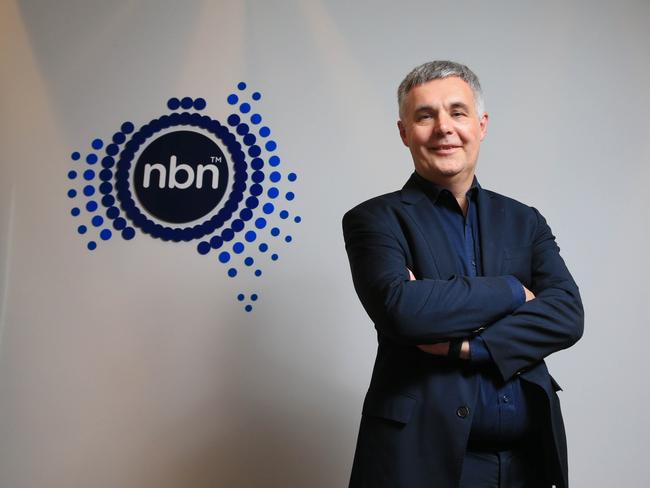Fibre-To-The-Basement excluded from NBN upgrade
NBN Co’s multi-billion dollar upgrade to the nation’s fibre network excludes important groups.

Hello and welcome to The Download, The Australian’s technology blog for the latest tech news.
Chris Griffith 11.55am: FTTB excluded from NBN upgrade
NBN Co’s bumper $4.5bn upgrade of the nation’s fibre network to gigabit speeds does leave out important groups.
Eight million Australians will be eligible for it under the plan to increase internet speeds for up to 75 per cent of fixed-line premises in Australia by 2023.

NBN satellite users are not among those eligible for the upgrade which concentrates on fixed-line services for homes and small businesses across the Fibre-to-the-Node (FTTN), Fibre-to-the-Curb (FTTC) and Hybrid-Fibre-Coaxial (HFC) networks.
There is another group that’s currently ineligible: Fibre-To-The-Basement (FTTB) installations where fibre is run into the basement of an apartment block and linked to copper that runs up the interior of buildings and into apartments and offices.
FTTB allowed for an easy and financially lucrative initial installation. In some cases, it only required a fibre cable to run into the building basement and the existing connections to residents’ copper lines in basements rerouted via a DSLAM (digital subscriber line access multiplexer).
In contrast, rewiring residents’ and businesses’ copper connections from the basement into their premises is a larger task and not part of this upgrade. NBN chief executive confirmed that FTTB isn’t part of the plan at a conference call with journalists.
There is the added issue of whether office towers with extensive copper cabling also are impacted. When asked about this, NBN Co says it “will continue to look at ways to enhance our other access networks”.
NBN isn’t saying what it could do, but an interim option could be protocols that increase data transmission speeds in copper beyond 100 Mbps, say to 400 Mbps. Some copper within buildings may be in good condition, and capable of a speed boost, not having been buried in the ground or exposed to the elements in the street. This approach obviously wouldn’t match fibre but could bring improvement.
Chris Griffith 9.15am: Trump administration moves to address ‘anti-conservative’ bias
The Trump administration is following through with its concerns about anti-conservative bias on social media platforms, along with getting platforms to address illicit conduct.
The Wall Street Journal reports that the US Justice Department has submitted a proposal to Congress that forces platforms to take more responsibility for content by winding back legal protections.

The WSJ says the move will impact companies such as Facebook, Alphabet’s Google and Twitter.
Under refinements to the proposal, internet companies will have immunity to take down material that promotes violent extremism, or self-harm.
Mr Trump says his administration is watching platforms “very closely” during the upcoming election for anti-conservative bias, the WSJ reports. Facebook and Twitter have removed posts by Mr Trump that they regarded as false, misleading or illegal, or have added warning notices to the posts.
“Both Democrats and Republicans say they want to review the legal protections internet companies enjoy, though they have differing concerns,” the paper reports.
David Swan 8.40am: Tech kept 3.2m Aussies working
New research says collaboration technologies helped keep millions of Australians working during the pandemic, and potentially prevented 1.6 million from being furloughed.
The report, released by AlphaBeta in partnership with Microsoft, has found that some Australian businesses implemented as much of some technologies in 2020 as they had in the past 10 years, in order to get through the pandemic.
It also found Australian businesses that used more technology were more resilient through the COVID crisis. More tech-advanced firms had more resilient revenues, were more likely to maintain employment and had more resilient profitability through the crisis.
“Almost nine out of ten firms adopted some new digital technologies through the pandemic helping them to cushion the impact of COVID on their sales, employment and productivity,” AlphaBeta founder Dr Andrew Charlton said.
The research also found productivity was three times higher in organisations that adapted their workplace to remote working – introducing policies such as flexible working hours, initiatives to increase social connectivity and plans to support physical and mental health.
Meanwhile nearly nine in 10 Australian firms adopted new technologies to improve their business continuity during COVID; with 45 per cent of businesses saying technology tools were essential or very important to continued operations.



To join the conversation, please log in. Don't have an account? Register
Join the conversation, you are commenting as Logout